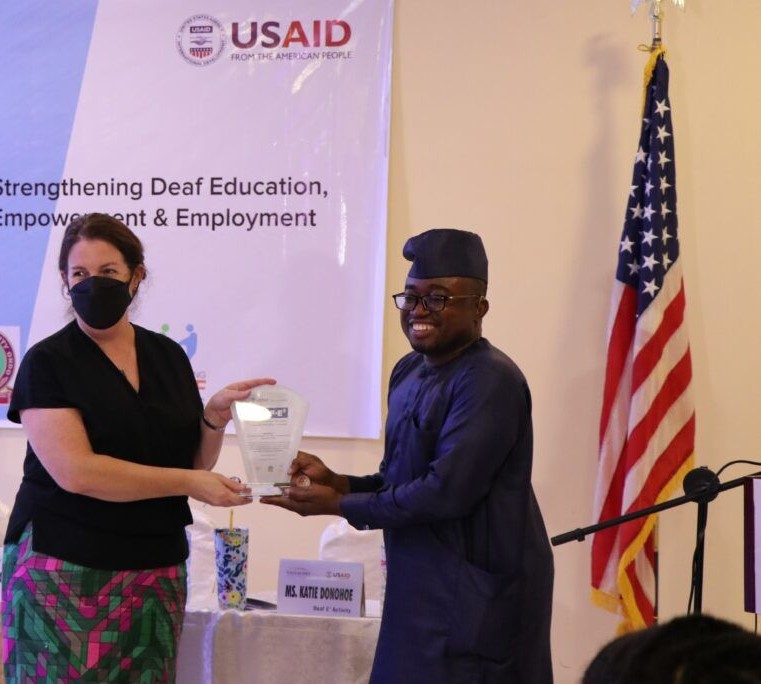The U.S. Agency for International Development (USAID) Acting Mission Director Katie Donohoe, together with officials from Gallaudet University, the Nigerian National Association of the Deaf (NNAD), and other partners have launched a new activity to empower deaf, hard of hearing, and deafblind children and youth through education, employment, and life opportunities in Nigeria.
Federal Senator from Nasarawa Umaru Tanko Al-Makura, who is part of Nigeria’s deaf community, also attended.
The new three-year, $2.05 million activity – Strengthening Deaf Education, Empowerment, and Employment (Deaf-E3) – will build the capacity of groups integral to advancing education that fully meets the needs of deaf, hard of hearing, and deafblind Nigerians, including educational professionals, Nigerian Sign Language interpreters, and development actors.
Fewer than 40 per cent of Nigeria’s deaf children are enrolled on primary school, and even fewer are allowed to continue into secondary education
“Through this partnership with Gallaudet, USAID is supporting a changing of the tide for the deaf community,” Donohoe said at the launch. “Deaf people can do anything hearing people can do, except hear. In fact, deaf, hard of hearing, and deafblind people can excel at all levels of education and employment when they are provided with an education that is accessible and designed for them to directly interact and communicate with their parents, teachers, and peers.”
The launch takes place on the International Day of Sign Languages during the International Week of Deaf People. Olufemi Ige, a Gallaudet University alumnus who serves as the Deaf-E3 Project Manager, provided a Nigerian Sign Language (NSL) lesson to commemorate the day and engage attendees in the recognition of sign languages as relevant and valued forms of communication for all.
Operational since May 2021 and continuing through 2024, Deaf-E3 will develop manuals to train educational professionals in a multimodal and multilingual approach in deaf education, build the capacity of NNAD and its stakeholders, establish a consortium of interpreters and deaf individuals to improve practices in sign language interpretation in education and increase the capacity of USAID and other development actors to promote awareness of the NNAD and other advocates for the deaf community.
“Fewer than 40 per cent of Nigeria’s deaf children are enrolled into primary school, and even fewer are allowed to continue into secondary education,” Fela Bank-Olemoh, Senior Special Assistant to the President of the Federation on Education Interventions said. “Programs like this are critical to ensure all stakeholder’s hands must be on deck to address the problem of under-education, under-development, and poverty among the deaf community.”
Considered the premier U.S. institution of higher learning for the deaf community, Gallaudet conducts research in many fields, including education, linguistics, psychology, educational neuroscience, deaf history and culture, and Black deaf history and culture, and already has a presence in Nigeria. Other Deaf-E3 activity partners include Wesley University–Ondo, Discovering Deaf Worlds, and the National Commission for Persons with Disabilities.


